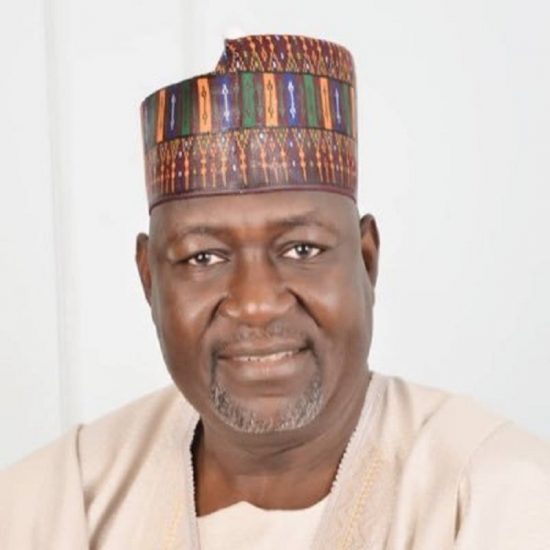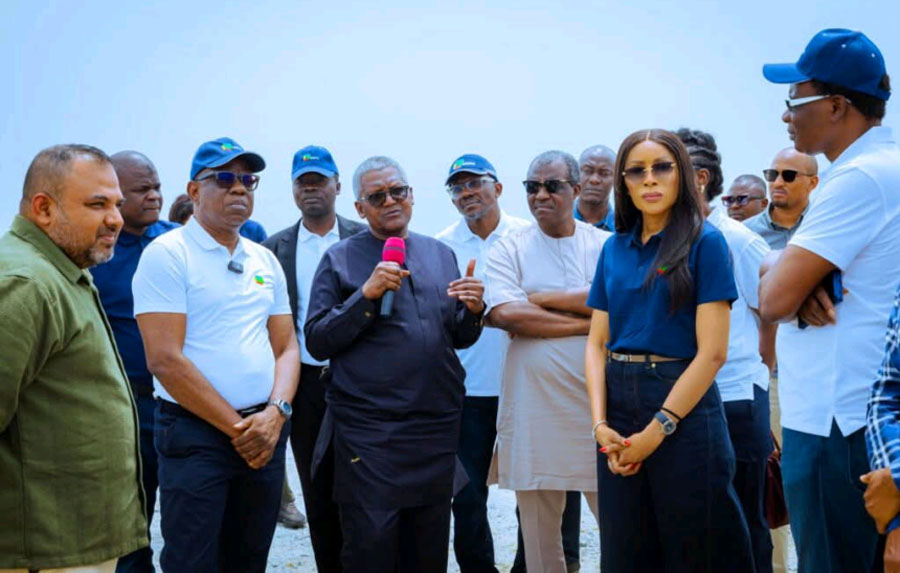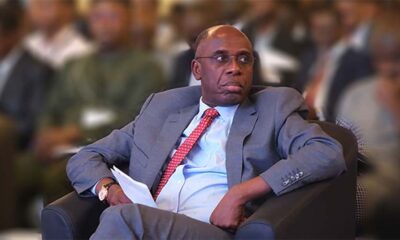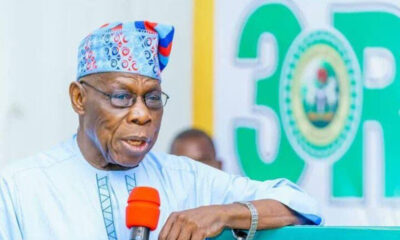Business
Electricity: FG to deliver 22,000MW next year, asks banks to sell off Disco shares

The Federal Government has asked banks holding majority shares in the power distribution companies to divest them within 12 months.
Minister of Power, Abubakar Aliyu, who said this on Tuesday, also disclosed that the current administration would bequeath 22,000 megawatts of electricity to the country before leaving office next year.
He said the government was monitoring the operations and divestment process of the six DisCos to ensure compliance with the core objectives of restructuring the power firms.
Aliyu spoke in Abuja at the 11th edition of the ‘PMB Administration Scorecard Series (2015-2023)’ organised by the Federal Ministry of Information and Culture.
He said the government sacked the previous core investors to make them more responsible.
The minister said, “For the benefit of the doubt when I say we have restructured the Discos this is just saying it mildly.
“Restructuring means that we have sacked the core investors. We have sacked the management and allowed the lenders to take over.
“Either banks or the Asset Management Corporation of Nigeria (AMCON) hold the franchise.
“So the banks have taken over 60 per cent ownership. We have allowed the banks, the Bureau of Public Enterprises (BPE) and the Central Bank of Nigeria (CBN) to take control.
“The lenders provided the chairmanship of the Discos. The BPE provided part of the management, including the managing directors and then the CBN provided the chief financial officer (CFO) and the auditor.
“So this is the position we are now with the six discos. They are Abuja, Kano, Kaduna, Benin, Ibadan and Port Harcourt. One may ask why only six? What about the rest?
“You know we have 11 of them. Three out of the 11 Discos are performing well, that is two in Lagos and one in Enugu. They are not doing badly.
“Jos Disco was re-concessioned in 2022 and Yola was re-concessioned last year. These two Discos are working very hard to improve. So we have to give time to settle down.
“In a way, we have restructured the whole of the 11 discos in one way or the other. Now, it is to help them since we have made them more responsible.
“We are trying to help them to get on their feet.”
The minister spoke about the Nigeria Distribution Sector Recovery Programme (DISREP).
He said, “It is a loan of $500 million which initially we refused to take for the Discos because of their situation. We don’t trust the way things have been handled.
“So, the loan has been there with the World Bank since last year but we did not take it until when we were able to restructure.
“Even now that Mr. President has approved through the Federal Executive Council, the DISREP; there are some conditions tied to them so that we can remove the risks attached to it. This is the situation.
“I hope and it is not going to be forever because banks are not in the business of providing electricity.
“So we have given them six months to one year to find someone serious to sell their 60 per cent equity to those in the business of electricity. This is the situation now and we are monitoring.”
He said the administration of President Buhari would bequeath 22,000MW capacity to the nation before leaving office next year, adding that Siemens was engaged in the power sector to raise the operational capacity from 7000 MW to 11, 000MW and 25, 000MW in 2025.
On tariffs, he said electricity is not a cheap commodity the world over.
He said Nigerians can cut costs by being careful about how they manage and use electricity, noting that the government was doing its best to protect lower-income citizens because of the nexus between lack of access to electricity and poverty.
The minister said, “We have service band from A to E. Accordingly, Band A will be provided with 22 hours of service. But they have to pay for it. Electricity is not a cheap commodity the world over.
“The cost of gas to power is being subsidised by the government by more than half to cushion the effects of electricity cost to the end users.
“The government used to fill up the gap. It used to be N600 billion per annum for the shortfall. But through some reviews we have been able to reduce it to N152 billion.
“Even at N152 billion the government pays in N152 billion, they take loans to pay in order to cushion the effect for all of us. And you know the situation of government finances nowadays. The government may not be able to continue doing that. We have to gradually live up to that.
“We have to be more careful about how we use electricity and how we are able to manage the electricity in order to reduce the cost by ourselves by using it when it is necessary. So this is the situation we are in.
“We have done all of this while protecting our lower-income citizens (that do not always receive adequate electricity) by maintaining subsidies for the lower tariff bands while allowing those with adequate power to pay relatively higher prices. Tariff shortfalls have been reduced by over 80 per cent and we are on the path to having a sustainable market that can pay for itself.
“We have put a focus on electricity poverty. It is proven through various studies that there is a strong nexus between lack of electricity access and poverty.
“Prior to this administration, there was no coherent policy on Rural Electrification with key provisions of the Electric Power Sector Reform Act to electrify rural populations largely ignored. “This administration established the Rural Electrification Fund that provides up to 70% grants for rural mini-grid and solar home systems. Currently REF has electrified more than 300,000 citizens in its short existence. The Ministry is working with REA to expand the Rural Electrification Fund to create more opportunities for rural access.”
According to him, this administration will bequeath to Nigerians 4,000MW of additional generating capacity. It will complete and commission the 700MW Zungeru Hydro Power Plant in the first quarter of 2023.
“We will also see to the operationalization of the 240MW Afam III and 300MW Okpai Phase II to mention a few. We will set the country on a stable path for 10,000MW of supplied energy (today we are at 8,000MW with 5,000MW on-grid and 3,000MW+ of industrial captive off-grid) and we will leave an installed capacity of almost 22,000MW.
“We also have robust programmes ongoing with facilities and investments secured of over $3 billion to eliminate the large gap between our transmission capacity and supplied energy.
“We have repositioned the Siemens Presidential Power Initiative (PPI) and after a slow start, we have begun to take delivery of critical equipment. You may recall that accelerated orders were placed for 10 power transformers and 10 mobile substations, with a delivery schedule beginning Sep’22. So far, six of the 10 power transformers have already arrived on the shores of Nigeria and we have started installation in various locations while the remaining four are expected in Dec’22 and January 2023. The mobile substations are expected from January 2023 through to April 2023.
“As far as I am concerned, it is a government-to-government collaboration between the Nigerian Government and the German Government through President Muhammadu Buhari and the previous German Chancellor, Angerla Merkel, where Merkel agreed to help in giving us a loan under concessionary terms to bring Siemens to implement the rehabilitation of our infrastructure in three phases. Phase one is to raise the operational capacity from 7000 MW to 11, 000MW to 25, 000MW.
“Phase I is supposed to be a quick one because already the TCN capacity is not matching or rather I would say the discos capacity is not matching with the TCN capacity. There are some interfaces, and infrastructure problems. You may have the capacity of TCN up to 8000MW but there is no evacuation due to some interface problem. So that is what Phase One is set out to do, to quickly take the level to where it is balanced.
“And then Phase Two is to further expand to 11, 000MW, and the Phase Three to take the whole value chain from generation, transmission to distribution through up to 2025 to 25, 000MW. So and the loan is around two million Euros.”
He said the government completed a total of 105 power transformer projects between 2015 to 2022, adding a capacity of 6,216MVA to the national grid.
He listed some of the completed power transformer/substation projects including the 150MVA 330/132kV Interbus Power Transformer at Ughelli, Delta IV transmission substation and the 150MVA 330/132kV power transformer at Ayade Transmission Substation
Others are the 2x150MVA 330/132/33kV Substation at Lafia, Nasarawa State, and the 2x60MVA 132/33kV Dawaki/Gwarinpa Substation which was recently completed in November 2022 under the Abuja Feeding Scheme.
The projects also included the 2x60MVA 132/33kV Gagarawa Substation, 2x60MVA 132/33kV Substation at Adiabor, 2x30MVA 132/33kV Yelwa Yauri the1x30MVA 132/33kV Ilashe Substation and the 1x40MVA 132/33kV Substation at Bichi, Kano State among others.
According to the minister, a number of substations and bay extensions were nearing completion and were expected to be inaugurated by the first and second quarters of 2023.
He said a total of 900km of reconductoring and construction of new transmission lines were completed during the period 2015 – 2022.
Business
CBN Mops Up $190 Million to Slow Rapid Naira Appreciation

CBN Mops Up $190 Million to Slow Rapid Naira Appreciation
The Central Bank of Nigeria (CBN) last week intervened in the foreign exchange (forex) market, buying about $189.8 million to slow the rapid appreciation of the Nigerian naira at the official window. Analysts say the move aims to absorb excess US dollar supply, stabilise the currency, and prevent market disruptions that could affect investors and the broader economy.
The naira had strengthened sharply in recent weeks, closing at around ₦1,346.32/$ in the official market — a week-on-week gain of ₦9.09. The parallel market also recorded gains, with rates improving by ₦60 to about ₦1,340/$. As a result, the FX spread — the difference between official and parallel rates — narrowed significantly to 0.47% from 3.29% the previous week, signalling improved convergence between the markets.
TrustBanc Financial Group noted that the naira’s successive rally could have prompted foreign investors to exit the fixed-income market, selling their holdings to repatriate profits. This scenario could have triggered higher US dollar demand, putting additional pressure on the naira and weakening market stability.
READ ALSO:
- FCT Poll: Falana Queries Wike’s Power to Declare Public Holiday
- Iran Threatens ‘Ferocious’ Retaliation as Trump Weighs Military Action
- Tinubu to Governors: State Police Must Begin Now
Normally, central banks sell dollars to support the currency, but the CBN reversed this trend for the first time in months, buying dollars to moderate gains and prevent speculative surges. Analysts said this measured intervention reflects the bank’s commitment to exchange rate stability and orderly FX market operations.
On the macroeconomic front, Nigeria’s external reserves have remained robust, surpassing $46 billion, supporting the CBN’s ability to manage market dynamics. Strong oil prices, rising reserves, and reform-driven FX inflows have contributed to the naira’s stability, even amid lingering geopolitical risks.
Economists warn that excessive naira appreciation could reduce the competitiveness of Nigerian exports and prompt capital flight, affecting domestic investment. By moderating gains, the CBN seeks to balance currency stability, investor confidence, and the nation’s economic fundamentals.
Investors and businesses are being urged to monitor the FX market closely, as central bank interventions may influence short-term forex availability and pricing. Analysts expect the CBN to continue careful market management while promoting long-term currency stability.
CBN Mops Up $190 Million to Slow Rapid Naira Appreciation
Business
Dangote Opens Refinery Investment to Nigerians With Public Share Sale Plans

Dangote Opens Refinery Investment to Nigerians With Public Share Sale Plans
Aliko Dangote, President of the Dangote Group, has announced that ordinary Nigerians will soon be able to buy shares in the $20 billion Dangote Petroleum Refinery, a move aimed at expanding public participation in one of Africa’s largest industrial projects. The announcement was made during a guided inspection of the refinery by NNPC Limited management, led by Group CEO Bayo Ojulari, and senior officials of the company.
Dangote stated that arrangements are being finalised to allow individual investors to acquire shares within the next four to five months, giving Nigerians direct ownership in the refinery. “Individually, Nigerians too will have an opportunity… in the next maximum four or five months, they will actually be able to buy their shares,” he said.
The Nigerian National Petroleum Company (NNPC) currently holds a 7.25 % stake in the refinery on behalf of Nigerians, ensuring that public interest remains a key aspect of the project. Dangote further explained that investors will have flexibility in receiving returns, saying, “People will have a choice either to get their dividends in naira or to get their dividends in dollars because we earn dollars.”
READ ALSO:
- SERAP Urges Tinubu to Repeal ‘Unlawful’ Mass Surveillance Regulations
- Trump Imposes 15% Global Tariff Hours After Supreme Court Blocks Previous Tariffs
- APC Wins Rivers Ahoada East State Constituency II Bye‑Election
Beyond the public share offering, Dangote highlighted ongoing collaboration with NNPC to enhance operations and explore opportunities across the oil and gas value chain, including potential upstream partnerships. “Most likely… we will partner with them, maybe in some of the upstream. They, too, will partner with us here because here is not a refinery. It’s an industrial hub,” he said.
The refinery is also set to support additional industrial ventures, including the production of linear alkylbenzene (LAB), a key raw material for detergents. Dangote noted that production will be sufficient to meet demand across the African continent within 30 months, underscoring the facility’s industrial significance.
Industry analysts expect the refinery to list on the Nigerian Exchange (NGX) through a phased public offering of 5–10 % equity, similar to earlier listings of Dangote Cement and Dangote Sugar. The move is aimed at enhancing market liquidity, transparency, and public participation, while retaining majority ownership by the Dangote Group.
The public share offering represents a milestone in Nigeria’s industrial and energy sector, offering citizens an opportunity to participate in a globally competitive infrastructure project while benefiting from dividends in local and foreign currency.
Dangote Opens Refinery Investment to Nigerians With Public Share Sale Plans
Business
CBN Policies, Foreign Inflows Drive Naira to Two-Year Peak

CBN Policies, Foreign Inflows Drive Naira to Two-Year Peak
Nigeria’s naira has extended its recent rally, trading at one of its strongest levels against the U.S. dollar in nearly two years, supported by sustained foreign portfolio inflows, tighter liquidity management, and targeted policy interventions by the monetary authorities.
A macroeconomic update by CardinalStone shows that the local currency has appreciated 6.9 per cent year-to-date at the official foreign exchange market, closing at ₦1,347.78/$—its strongest performance since early 2024. The appreciation reflects improved FX liquidity and growing confidence in the official trading window.
Despite the gains, a gap persists between the official and parallel markets. However, the premium narrowed from about 5.7 per cent to roughly 3.2 per cent following renewed foreign exchange interventions by the Central Bank of Nigeria. According to CardinalStone, the compression of the spread indicates stronger liquidity conditions in the official market, reducing incentives for speculative trading and arbitrage.
As part of efforts to further stabilise the FX market, the CBN recently authorised licensed Bureau de Change (BDC) operators to access foreign exchange from approved dealers at prevailing market rates, subject to a weekly cap of $150,000 per BDC and strict Know-Your-Customer (KYC) requirements. Under the framework, operators must sell unused FX balances within 24 hours, limit cash transactions to 25 per cent of total trades, and settle transactions through licensed financial institutions.
READ ALSO:
- Edo Governor Okpebholo Names Mercy Johnson-Okojie Special Adviser
- Many Feared Dead as Suspected Lakurawa Militants Attack Kebbi Communities
- AMAC Polls Shock: Another PDP Candidate Withdraws from FCT Race, Backs APC
With 82 licensed BDCs currently operating, CardinalStone estimates that potential FX supply to the segment could rise to about $50 million monthly. Although this remains significantly below pre-pandemic levels, the renewed supply has helped ease retail FX demand pressures and compress the premium in the parallel market.
While foreign inflows have strengthened the naira, analysts caution that continued appreciation could prompt profit-taking by offshore investors. CardinalStone estimates outstanding foreign portfolio investment (FPI) exposure at between $12 billion and $14 billion, noting that Nigeria’s carry trade remains one of the most attractive across emerging and frontier markets.
The firm added that assuming many investors entered the market at around ₦1,500/$, a move toward ₦1,200–₦1,250/$ could deliver over 22 per cent FX gains on currency alone. Such gains could heighten the risk of portfolio rebalancing or exits, particularly as political and election-related uncertainties begin to build.
Ahead of the latest meeting of the Monetary Policy Committee, analysts describe the macroeconomic signals facing policymakers as mixed. Inflation has started to moderate, while short-term interest rates have converged near 22 per cent, about 500 basis points below the 27 per cent Monetary Policy Rate (MPR).
However, the CBN has signalled low tolerance for excess liquidity, intensifying Open Market Operations (OMO) issuances and keeping the Standing Deposit Facility (SDF) attractive to absorb surplus funds and prevent renewed inflationary pressure. Analysts also point to concerns around election-related liquidity, which is expected to intensify in the second half of the year, with over 75 per cent of projected 2026 liquidity expected in the first half.
Looking ahead, CardinalStone expects the CBN to hold the policy rate while adjusting the asymmetric corridor to align SDF rates with OMO yields and preserve the attractiveness of naira assets for foreign investors. Forward market indicators suggest a softer currency path later in the year, with the naira projected to trade within a ₦1,350–₦1,450/$ range in 2026, despite the recent rally.
CBN Policies, Foreign Inflows Drive Naira to Two-Year Peak
-

 Business2 days ago
Business2 days agoDangote Opens Refinery Investment to Nigerians With Public Share Sale Plans
-

 Education3 days ago
Education3 days agoUTME: JAMB Clarifies Position on Hijab During Biometric Capture
-

 Politics2 days ago
Politics2 days agoTinubu Hails Wike as APC Dominates 2026 FCT Area Council Elections
-

 Entertainment2 days ago
Entertainment2 days agoRegina Daniels Takes Delivery of ₦150m 2026 GAC Trumpchi M8 SUV
-

 Politics3 days ago
Politics3 days agoADC Defeats APC to Win First Polling Unit in FCT Area Council Election
-

 Politics2 days ago
Politics2 days agoFCT Council polls: APC Wins Four Chairmanship Seats as PDP Takes Gwagwalada
-

 News2 days ago
News2 days agoYoruba Muslim Group Dismisses Viral Ramadan Date Claim, Reaffirms Sultan of Sokoto’s Authority
-

 Politics2 days ago
Politics2 days agoOpposition Weakens as Another Governor Eyes APC Move















